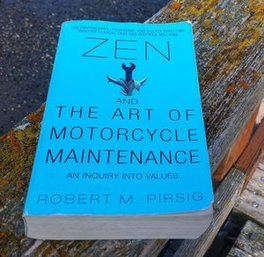
Some fifteen years later, after grad school, after some spiritual awareness, after witnessing what mental illness can do to a loved one, after having my own adult ups and downs, and after realizing I wasn't the mechanic I thought I was (humility), I think I finally got it enough to get it. And now, another twenty-plus years later and after yet another reading, I feel I get it even more.
At the beginning of the book, Pirsig says it's not really about motorcycles or Zen Buddhism at all. After my first reading, I agreed. Now, not so much. Any true motorcycle lover knows his/her bike, knows the road, and knows the ride only exists in the moment. The motorcycle is the perfect metaphor for life. Breakdowns, breakups, repairs, losses, love, mistakes, the crests of mountains and the valleys on the other side; these are the nuts and bolts of life. You don't get any more or less Zen than this. As far as that goes, after practicing Zen for long enough, there isn't anything that isn't Zen.
I'm not sure what Pirsig's intention was in the writing of this book. I imagine it was multifold. I know the rewards of reading it are. However, from the perspective of where I am now in my life, I would say that Pirsig has written the definitive book of American Zen. It should be classed with Cold Mountain Poems. Like Han Shan, Pirsig is no priest nor monk. He is a common man navigating a common life. Without beating his chest or even much discussion of Buddhism or what not, he offers a very Zen glimpse of what life is like. To the uninitiated, Zen may appear as mystical and magical, some Oriental version of perfection, or to use Pirsig's obsession, quality. But it's not. Zen is thisness, thusness, suchness. It is all this and nothing at all. It includes machines and rhetoric, logic and koan. I can't speak for anyone else, and frankly don't want to. I can say, that for me, my life wouldn't be the same without this one book. Thanks, Robert.
From NPR
From The NY Times
 RSS Feed
RSS Feed
